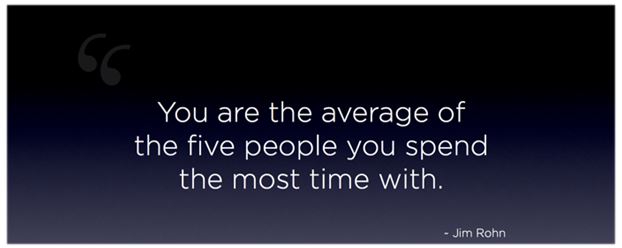The importance of focus in achieving financial goals can’t be underestimated if you want massive success.
These powerful tips, tricks, and hacks will help you achieve your financial goals faster and with greater success.
The Power of Focus to
Accomplish Your Financial Goals

Rule #1: Focus on Purpose:
Know What You Really Want Financially
Without focus, financial success is just a fuzzy image like the picture above.
If you don’t clearly define what success looks like and what you really want, you will be plagued by never seeing your vision clearly enough to create it.
If you want to earn 6 or 7 figures a year, you must have clarity on exactly what it will look like.
One of the surest ways to lose focus of your financial goals is by allowing yourself to be torn between what you want right now and what you really want.
If you aren’t careful you’ll shoot yourself in the foot (metaphorically speaking).
My wife and I recently celebrated our anniversary.
I dipped into my wealthanizing fund (which you should never do) to really create a wonderful day and memory for my wife.
It was fun and enjoyable and I only “borrowed” about $500 out of the account.
But we both know that I will never pay myself back for that money.
I stole from myself and kicked my financial goals down the road because I sacrificed what I want someday… for what I wanted right now.
I could have celebrated my anniversary and given my wife an enjoyable time without taking from what I have set aside for building wealth.
This was stupid.
Yes, I do stupid things too.
Building wealth (like anything else) cannot withstand a lack of purpose or divided resolve.
You must always keep your goal clearly in focus and pursue it with intensity and massive action.
The fact is, building wealth is simple, it just isn’t easy.
There’s a huge difference between simple and easy.
I use the weight loss analogy alot and I’m going to stop eventually… but let’s do it just one more time…

It’s like losing weight.
Everybody knows how to lose weight.
Losing weight is simple… Consume fewer calories than you expend.
Substitute healthy habits for unhealthy ones and you’ll be successful.
But it isn’t easy because people are torn.
They are desiring weight loss AND desiring something else (chocolate cake, ice cream, pizza, beer, cheesecake, etc).
As they say, you can’t have your cake and eat it too.
Many times weight loss companies sell you their latest & greatest secret sauce for losing weight.
They even show you pictures (proof) of everybody it’s worked for so you know that surely if it worked for them… it will work for you.
The problem of course, is that they aren’t selling prepackaged resolve or commitment.
You can’t box up focus.
When you see somebody in a picture who lost 60 lbs. or more in 90-180 days… it’s because they got to a point where they decided enough was enough.
The made a commitment and focused on their goal with intensity.
They may have chosen p90X or whatever other program is out there, but it didn’t work because of the program.
It worked because they were so sick and tired of being fat that they controlled their caloric intake and exercised vigorously.
That’s why the programs don’t work for everybody… because everybody who buys them is NOT at the point in their life where they totally commit to change, no matter what.
People who find financial success are NOT a house divided, they are completely committed to financial goals.
Related Articles:
– How to Build Wealth Starting with $1,000
– The Ultimate Guide to Making Money on YouTube
Rule #2: Don’t Cheat Yourself
When it comes to your finances, don’t cheat yourself and your progress by spending money on things you don’t need.
Let me clarify that a little more.
You shouldn’t be spending your money that is earmarked for building wealth on entertainment or things that don’t serve your financial goals (like I did on my anniversary).
The more money you can earmark for building wealth (and then not use for other purposes), the faster you will reach your financial goals.
Don’t say “I’m going to put $700 a month toward building wealth” and then only put $100 a month in your fund because you really want a… whatever (fill in the blank).
It’s good to have some money set aside just to spend on yourself, but it should only be a little (at first), not enough to buy anything you want anytime you want it.
At least not until you’ve reached your financial goals.
If you set too much money aside you’ll either get comfortable because you won’t be hungry and driven or you’ll slow down the process by slowing down the momentum.
Rule #3: Discipline Yourself so Life Won’t Have to.
You absolutely must learn to discipline yourself.
I firmly believe that self-discipline is a lost art form that holds the majority of people back from accomplishing their goals.
Almost every goal (including financial goals) in my life that I didn’t achieve can be traced back to a lack of self-discipline.
Think about it.
No really, take a moment to think about it.
Not making sales calls?… Self Discipline issues.
Not getting to work on time?… Lack of self discipline.
Running your mouth getting you in trouble?… Do you see a pattern?
Not going to the gym?… Where is your self-discipline?
Eating the wrong foods?… (yes, I went there again)…
A lack of self-control and self-discipline.
I could go on and on here.
The point is that you’ve got to discipline yourself to do the proper activities or life will discipline you by not giving you what you want.
As Jim Rohn says, the world responds to deserve… not to need.
How to Achieve Financial Goals Rule #4:
Get Back on That Horse… FAST!
Fall down 7 times… get back up 8.
Getting up is important, but so is getting up quickly.
When you do mess up (and you will), make sure you get back on track quickly.
Don’t be like the dieter that falls off the wagon and thinks, “oh well, I guess I’ll just get serious about it next week”.
That mentality leaves the entire week open to just eat junk food and sets you a week back instead of a day (or an hour).
The same thing goes for spending money out of your wealth building account.
If you dip into it and spend some, don’t use that as an excuse to keep spending or even to throw caution to the wind and spend it all.
Get out of that mindset as soon as possible and don’t touch your investment capital for any reason (other than investing it in something that could make you more).
AGAIN: Do NOT touch it for any reason!
NOT EVEN WHEN IT’S LARGE ENOUGH TO BE VERY TEMPTING!
Your day of spending will eventually come.
After all, there is a time for everything under the sun.
A time to save and a time to spend.


Spending day arrives when you’re spending the residual income created by your efforts.
At that point, spending money doesn’t set you back as long as you only spend the passive income you’ve created.
The key is to make that passive income as excessive as possible so you can really enjoy spending it (or doing good with it) and then do the same thing the next month, and the next, and then next, and the next… and so on.
I think it was Jim Rohn who suggested making it a goal to get to the point where you are only living on 10% of your income and giving the rest away (or reinvesting it) because you really don’t need it.
He used to say people called him crazy but he would tell them “you should see the 10% that’s left”.
Basically, his point was that the 10% was so large it was unnecessary to hold on to the other 90%.
If you find this is difficult for you, please refer back to Rule #2: Don’t cheat yourself.
What would your life look like if you could live well off of 10% of your income?
Financial Goals Rule #5:
Tithe 10% to God


Whether you believe in the Bible or not, I encourage you to really consider this scripture.
You don’t have to believe in something to benefit from it.
Tithing is one of those concepts that people have a hard time with.
It’s counter-intuitive.
I’m sure I would be one of those people except I was taught to tithe at an early age and for some reason it stuck.
It wasn’t until later in life I realized it was the single most productive thing I do to help me reach my financial goals.
Yes, you heard me correctly.
It’s completely counter intuitive, I know that.
But it’s a powerful strategy that works.
I think there an unseen law of the universe at work here that can’t be broken.
I once got an unexpected check (scholarship) in college and had a close friend of mine tell me “when it comes to money, you’re the freakin’ luckiest person I know”.
Luck doesn’t exist.
It wasn’t luck.
It was that I was consistently applying an unseen law that God placed into the fabric of the universe.
I was tithing even then, on the little I had.
So What Exactly is Tithing?
Tithing is the practice of giving the first 10% of your income to God.
It’s the first check I write every month.
In fact, I often write it before even looking at my monthly expenses.
It’s not something you do if you can, it’s something you do first.
Tithe literally means “tenth”.
Why does Tithing Work?
Let’s suppose for now, regardless of your personal beliefs, that it’s possible there was no big bang or primordial soup unless it was designed that way.
That intelligent design, we’ll assume for our purposes here, was by a designer who created all the physical, non-physical, and scientific laws of the universe.
Let’s also agree that as a species, humans have not figured everything out yet.
We know some stuff exists.
We know how some things work.
For other things, we know they work but we haven’t cracked why they work yet.
Then of course, we also know there are things we know absolutely nothing about… yet.
One look at all the advances in science and technology and you know there is still so much that is undiscovered.
Let’s unpack the verse I’m basing all this on.
Malachi 3:10 states…
“Bring the whole tithe into the storehouse, that there may be food in my house. Test me in this,” says the Lord Almighty, “and see if I will not throw open the floodgates of heaven and pour out so much blessing that there will not be enough room to store it.”
Relying on our presuppositions (that there may indeed be an intelligent designer), we can conclude that this entity could design the world anyway He (or She or It) wanted .
I believe in the God of the bible so I’ll stick to the word God to represent this unseen force.
If God created the universe and did indeed embed a law of tithing (like the law of gravity) into it, this verse gives us insight into how it works.
For it to work, you must follow the basic principles of tithing.
Principal 1 – You Must Bring the Whole Tithe
Whole means entire.
Tithe means tenth.
You must give 10%.
You can’t give 3% and expect the law of tithing to work.
Principle 2 – Tithing goes to the Church
I believe people get this wrong sometimes.
They interchange giving and tithing.
They are not the same thing, even at a fundamental level.
This verse says to bring the “tithe into the storehouse, that there may be food in my house.”
Suppose you’re God for a moment and you want your church to have resources, it would make sense that when you create your universe and law of tithing that you would link it directly to the tithing going to the church.
In biblical times, storehouse refereed to the temple treasury and “my house” referred to the temple.
Getting into the intricacies of this could be a blog post on it’s own.
But my knowledge and experience is that tithing as a wealth strategy only works if you’re giving it to a bible based church (I struggled for words here because that terminology can be dissected as well).
Suffice to say, stay safe and give it to a church or your experiment is doomed to failure.
Principle 3 – God Encourages us to Test Him on Tithing
This is the only place in the Bible where God encourages us to test Him.
I have… and He passes every time.
I can’t make you tithe and to be honest, I don’t care if you do.
But if you’re looking for a wealth building strategy with power and you haven’t tried it, I suggest you give it a go.
It’s not magic or some sort of weird voodoo, but it works if you apply it consistently.
I can’t specifically point to a moment of tithing and link it directly to a financial gain.
But I can say I’ve tithed consistently for more than 20 years and have been blessed over and over.
Blessings that came out of the blue and couldn’t be linked to my personal activity.
So what does “the floodgates of heaven” and “so much blessing” mean?
I think it’s different for everyone.
I don’t think it’s only about financial goals either.
Do what you want, but if you’re not implementing this strategy or at least testing God on it, I think you’re leaving some abundance on the table.
It’s an experiment worth considering.
It’s not me who came up with the test and I’m not the one that promised to pass it, I’ll leave the proving of the principle to God.
Rule #6: Develop a Growth Mindset & Fail Faster
The growth mindset is somewhat of a buzzword right now in educational circles.
However, we can borrow some of the ideas and apply them to business and the achievement of financial goals.
The growth mindset is a concept that was created and popularized by the findings of research by Carol Dweck.
The concept was born out of her studies of the behavior and learning of children, as well as other advances in neuroscience and brain plasticity.
The general idea is that people have two basic mindsets, either a fixed mindset or a growth mindset.
These mindsets dictate how people interpret their world in relation to learning and growth.
If you have a fixed mindset, you believe your intelligence, talents, and skills are fixed.
You either have certain traits and abilities or you don’t.
If you have a growth mindset, you believe fundamentally that intelligence, talents, skills, and abilities are a bi-product of your experiences and hard work.
We’ve all met people who say things like “that’s just how I am”.
Those people are coming from a fixed mindset.
They don’t believe (or don’t want to believe) that they can change.
These two mindsets approach the world and goals in completely different ways.
If you have a fixed mindset, you don’t put much effort in because you kind of think, “what’s the point”.
If you have a growth mindset, you believe hard work and learning can get you where you need to go, so you work harder.


It’s not just a cute saying, it actually has scientific neurological research to support it.
Who would have guessed?
The idea of a self fulfilling prophecy is actually backed by science.
What does this mean to you?
Well, if you’re reading this, chances are you have a growth mindset already.
But you’ve got to learn to guard it. Life has a way of trying to take belief from people. So determine today that any failure you have is just a part of growth and learning.
This leads us to the second part of the bullet point- Fail Faster.
Once you accept that failure is a part of learning and really believe it, then your success becomes a simple algebraic equation.
You know that you will have to go through X number of failures in order to achieve your financial goals.
You don’t know what X represents or what the number is, but to get there you’ve got to fail.
So technically, the faster you move from failure to failure (and learn from each one), the faster you reach your financial goals.
People with a true growth mindset don’t stay down very long after a failure.
They get shake it off, get back up, and start moving toward their goals quickly.
If you’re interested in this concept, I highly recommend the book Failing Forward, Turning Mistakes Into Stepping Stones for Success by John Maxwell.
Rule #7: Create (and Live) on a Budget
This is one of those easier said than done ideas.
But at the end of the day a budget is a necessary evil.
A budget’s success is directly affected by the other rules I mentioned and once implemented consistently, it’s super powerful.
But if you have a hard time with Rule 1, 2, 3, or 5, it will negatively affect your ability to stick to a budget.
If you don’t know what you really want (Rule #1), a budget won’t make sense to you because you won’t understand the purpose.
Rule #2- “Don’t cheat yourself” is directly related to this rule as well.
Of course, the entire concept of a budget falls apart if you can’t or won’t discipline yourself (Rule #3).
And tithing 10% (Rule #5), isn’t going to happen without a budget either.
Why not go ahead and flesh out a good budget that will help you achieve your financial goals quicker.
There are two types of people reading this right now.
One group, called savers, are nodding their heads in agreement.
One group, called spenders, are rolling their eyes in disgust.
So if you’re a saver, I’ve got nothing to say to you except I encourage you to add a line item in your budget that is simply for blowing money on what you want.
It makes life more enjoyable.
Not every penny has to be saved!
If you’re a spender, I want you to view a solid budget as a means to an end.
If you budget correctly and use it as a means to build wealth and achieve your financial goals, the day to spend will come.
There will be a day when you can virtually live free of a strict budget.
I said it before and I’m saying it again.
If you focus on creating an income that is passive and hefty, when it’s time to spend, you’ll have plenty to spend and your coffers will be replenished monthly (or weekly).
You’ve got to get there first though.
If you can’t commit to that and especially if you can’t change your way of thinking, you’ll be on a perpetual cycle that leads to nowhere.
Let’s say you agree to some of these ideas but don’t change your thinking.
The first time you get $50,000 you’ll probably have a new pool or fancy SUV.
More importantly, your 50k will be gone and you’ll be starting over.
Wouldn’t it be better to flip that 50K into 100K or 200K?
So budget wisely, spend wisely, and set aside capital for financial growth that you never touch.
You can spend the excess profits occasionally if you really can’t help yourself, but don’t touch the principle or you’ll be going backwards.
Rule #8: Surround Yourself with the Right People


This rule can be rather difficult at first if you’re currently spending time with the wrong people.
Jim Rohn said it best when he said:
You are the average of the five people you spend the most time with. -Jim Rohn Click To TweetI know this is a favorite quote of Tony Robbins as well.
For the purposes of this post, let’s focus on the financial health of the people around you.
You can’t just ignore this rule, thinking you won’t be brought down by your friends.
Trust me, one of two things will happen, either (1) you will be brought down… or (2) you already have.
The only time you won’t be brought down by those closest to you is if they are at a higher financial level than you are.
That’s the secret.
Practice life with those who are better at you in a particular area (i.e. finances and wealth) and you will get better as well.
This works in all areas of life.
Sports are a good example.
If you want to get better at golf, tennis, or any other sport, you’re best bet is to play with people who are better than you.
By playing with them, your skills will improve.
You’ll learn to play at a higher level.
You’ll learn to compete at a higher level.
The problem is that it’s not as fun because you won’t start off winning, you’ll probably get pounded.
It’s much more fun to play somebody that that you can beat consistently.
However, your skills don’t improve as much and to some extent they may get worse.
Apply this principle to life and you have a very similar situation.
If you hang out with those who are doing better than you financially, it can be uncomfortable sometimes.
You may feel like you’re losing because they’re doing better than you at the money game.
It can be uncomfortable, intimidating, and even a little frustrating (just like a game of golf).
But the initial object is not to beat them in the game (at least not at first).
The object is to leverage this strategy in order to play the financial game better yourself.
Think about that the next time you’re hanging out with your broke friend who just wants to complain instead of taking action to solve the problem.
Rule #9: Don’t Beat Yourself Up
Seriously, don’t be this guy.
When you go into a woe is me mentality, it serves no purpose.
When you make mistakes, lose money, and fail to perform how you thought you would, it’s easy to beat yourself up.
It’s also easy to justify beating yourself up.
I’m sure the guy in this video had his reasons.
They were probably valid to him at the time.
Maybe he wanted a million views (he had 1,644 when I posted this).
His plan probably didn’t include the final outcome, a bloody nose.
The same thing is true for you if you beat yourself up.
You may not think you’re doing as much damage as you are, but trust me, you’re making things worse.
Get back up.
Brush yourself off.
Learn from the mistake.
Move on.
It’s that simple.
Review of Top Rules and Hacks for How to Achieve Financial Goals
- Focus on Purpose – Know What You Really Want Financially
- Don’t Cheat Yourself
- Discipline Yourself so Life Won’t Have to
- Get Back on that Horse – Fast.
- Tithe 10% to God
- Develop a Growth Mindset and Fail Faster
- Create and Live on a Budget
- Surround Yourself with the Right People
- Don’t Beat Yourself Up
Implement these basic rules and strategies for reaching your financial goals and you’ll accomplish much more in less time.
If you found value in this content feel free to share it and we love to hear from our readers in the comment section.
Also, as always, if you would like to work closely with us and let us help you achieve your financial goals, please visit our application page to for details.
Lastly, if you feel empty inside, financial goals won’t fill that void.
That void was designed to draw you back to your creator.
Jason & Daniele
Keep moving forward and never quit.
“It does not matter how slowly you go as long as you do not stop.” ―Confucius






